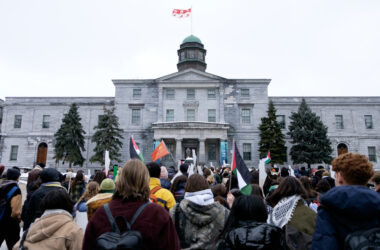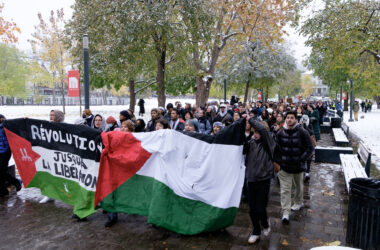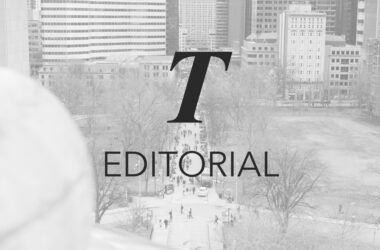
Third in queue at a Barclays bank in central London during winter break, I read through squinted eyes the BBC’s announcement that Julian Assange, the controversial founder of Wikileaks who was wanted by Interpol for alleged sex crimes in Sweden, had been arrested at a London police station after turning himself in at a previously appointed time. A close follower of the Wikileaks controversy—then climaxing after the disclosure, in trickles, of hundreds of thousands of secret American diplomatic memos—and a part-time member in the international Julian Assange fan club, I immediately left the bank line, looked up at an Internet café the address of the court to which the BBC said he was being taken, and nearly tore my calf muscles trying to book it to Westminster as fast as I could. I was met by a massive and still growing horde of reporters, photographers, news crews, and protestors, blocking traffic across Horseferry Row and spilling around the block. The Wall Street Journal reporter covering the story told me Assange had already been in the court for nearly an hour. If he came out one door, he was a free man; if he came out the other, he’d been denied bail, and would be taken immediately to some prison. I elbowed my way into the crowd, and waited.
I say part-time member of the fan club because like many people I’m not sure how I feel about the case. As with every news story, I’m consumed with the desire to have the “right opinion”—but in this case it’s not obvious to me what that is. I stood in the London crowd and tried to figure things out.
As every apologist for Wikileaks is careful to point out, defending the organization against American bullying and defending its founder against charges of rape are two entirely different things. However, the fact that the United States seems intent on using his present incarceration to extradite him to America to face totally unrelated charges resulting from the documents leaks makes one wary of possible American influence in the Swedish judicial system. (It was announced only this past weekend that the American government had subpoenaed the Twitter accounts of Assange and other Wikileaks collaborators, evidence of a mounting criminal investigation that may try to bring him from England or Sweden to the U.S. for trial.) Despite the seemingly trumped-up nature of the rape charges, though, I am no more privy to the facts of those situations than are the other commentators who have prematurely—and some say, misogynistically—cleared Assange of all charges of sexual misconduct. Sweden may have unusually inclusive rape laws, but I’m not interested in allowing Assange an exception to the rules. Whether or not the rape charges were prompted by nefarious American influence we may have to wait years for Wikileaks or another organization to reveal. In the meantime, I suggest a suspension of judgment and permission for the judicial process to run its course.
The (probably) separate issue of the leaks is another thing I remain unhappily ambiguous about. I doubt whether the disclosure of the diplomatic cables was necessarily a good thing, whether it proved anything (many have pointed out that it actually proves conspiracy theorists overwhelmingly wrong about American evil), and whether a comparison can be made between what Assange is doing and what Daniel Elberg did with the Pentagon Papers in 1970. Rather, it’s hardly a stretch to consider Assange and his associates as self-inflated Quixotes, swinging at windmills of perceived American iniquity, doing far more harm than good by putting at serious risk the safety of innocents who collaboratorated with coalition forces in Iraq, Afghanistan, and elsewhere and were promised anonymity. Many people, particularly on the left, have jumped far too quickly to Wikileaks’ defense. While I too am concerned about American empire, government secrets, shady dealings, cover-ups, and war; while I leap reflexively to the defence of any group or individual I see being bullied and threatened by the officials of any government for acts hostile to that government; and while the endorsement yesterday of Wikileaks by the McGill Daily editorial board undoubtedly should have cleared up any remaining confusion as to whether supporting Wikileaks is the “right opinion” for someone of my age, race, socioeconomic status, and ideological disposition, there is something about the whole affair which prevents me from defending Assange and Wikileaks unequivocally.
Shortly after 3 p.m., Assange’s lawyer announced to the waiting masses that bail had been denied. A few minutes later a van with tinted windows emerged from a garage at the rear of the building. Police pushed photographers and protestors aside so it could pass into the street and deposit Assange safely in a London jail. People banged on the windows and shouted, “Political prisoner! Political prisoner!” I stood silently, asking myself whether I agreed with that assertion. I watched the van roll into the street and around a corner and out of view. I didn’t know what to think.








